
Surbhi Gupta was in a race against time outside New York’s Nassau County International Cricket Stadium. Team India’s presser after its campaign opener against Ireland was over and Rohit Sharma’s men were on the way out. She had a few minutes to find the perfect spot to watch them boarding the team bus.
She did find a spot a little away from the crowd. Apart from a middle-aged guard hired by the stadium management, she was largely alone as she waited. “Maybe your main man has left in a car or something...,” the guard said. Having seen Rohit and Virat Kohli board the bus after a warm-up game at the same venue a few days prior, Gupta knew that was not the case. She told him the “main man” and his buddies would be out soon.
“You know, the FBI is here... these guys should be such stars,” said Taylor (name changed), amused by the craze. Gupta confirmed they were indeed celebrities back home and the security would only be tightened further for the India-Pakistan contest. “Sad I would not be on duty for that game,” he said. “Maybe I will tune in from home. But what’s the point, I don’t get the rules.”
Taylor, like most Americans today, is unaware that Benjamin Franklin had brought a copy of 1774 Laws, the then official rule book of cricket, to the US in 1754, 38 years ahead of the formation of India’s first cricket club in Calcutta. It is also unlikely that they know that when the USA met Canada for the first recorded international cricket game in New York’s St George’s Club (Sep 24-26, 1844), the first summer Olympics of modern history was still 52 years away.
The US is not a land yet to embrace cricket, as most think. Rather, it was a pioneer of the game, which attracted American spectators in thousands two centuries ago.
Bu hikaye THE WEEK India dergisinin June 23, 2024 sayısından alınmıştır.
Start your 7-day Magzter GOLD free trial to access thousands of curated premium stories, and 9,000+ magazines and newspapers.
Already a subscriber ? Giriş Yap
Bu hikaye THE WEEK India dergisinin June 23, 2024 sayısından alınmıştır.
Start your 7-day Magzter GOLD free trial to access thousands of curated premium stories, and 9,000+ magazines and newspapers.
Already a subscriber? Giriş Yap

The day of the knuckle-duster
Several narratives have emerged from the Donald Trump-Volodymyr Zelensky-J.D. Vance dust-up in the Oval office, the most disturbing being the opinion that “Zelensky invited it”.

The AGI dilemma
Spooky and powerful, AGI (Artificial General Intelligence), the planet’s newest technology, has divine benefits, as also diabolical applications that can trigger our destruction.
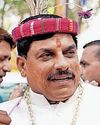
I want to transform MP into a powerhouse of development
GIS 2025 surpassed expectations in investment commitments, participation, and policy impact.

It is not NEP 2020, it is RSS 2020
TAMIL NADU’S RESISTANCE to the three-language policy under the National Education Policy (NEP) 2020 has reignited the debate over linguistic identity.
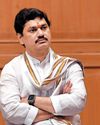
Munde blues
Just months into its tenure, the Fadnavis government suffers multiple blows
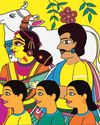
Plastic buckets and parliament seats
The plastics industry boomed in the 1970s when our rulers told our people to make fewer babies. The dairy industry, already on a high milkmark, should boom if Telugu Desam MP Kalisetti Appalanaidu gets people to make more babies. What’s the connection? Hold on. First listen to India’s population story that’s already a statistical farce, and may soon be a political tragedy.

MDGA-Make Diplomacy Great Again
Must say that all the reports of 'Agent Krasnov' make fascinating reading—like one of those old school, thick-as-a-brick bestsellers that Irving Wallace and Robert Ludlum used to write.

In search of Pampa
Salman Rushdie breathes life to the forgotten goddess Pampa Devi in his novel Victory City (2023).
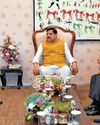
Centre of attraction
If the enthusiasm at the Global Investors Summit is anything to go by, Madhya Pradesh is poised to write a new chapter of development
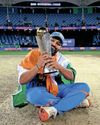
RO AND BEHOLD!
As the Champions Trophy win showed, the Rohit Sharma-led veteran brigade might not be over the hill. However, they will have to be on their toes as age and younger talent catch up